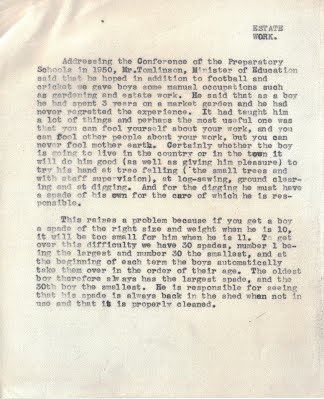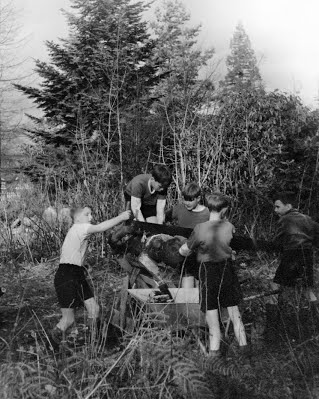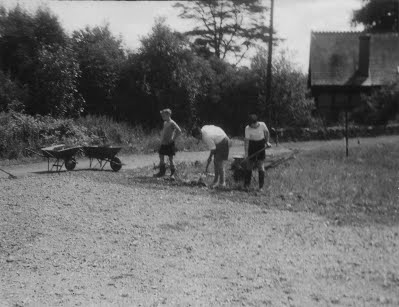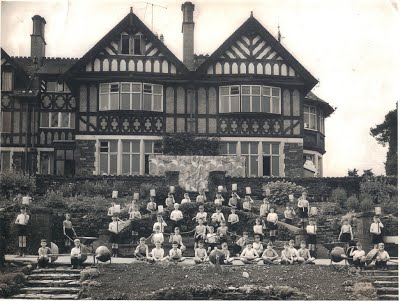Estate Work
Estate Work was an important part of learning manual skills, contibuting to the development and upkeep of the school and to the boys keeping fit!
Hubert Butler wrote about the role of Estate Work after attending the Conference of Preparatory Schools in 1950:
(You can download a text version of this document and another one about logging at the bottom of this page).

Early 1950’s
“I do not remember “cohorts” but it is quite probable that we had them! Estate work made a big impact on my life and I am still good at it! We each had a spade and tools had to be cleaned in the lake before being hung up again in the basement afterwards.
The cricket pitch was the major task. We dug tunnels into the hillside with planks for the barrows to run on. Getting hold of a wheel-barrow was a big challenge and running it fully loaded, downhill into the marsh was great fun. Striking rock was a bit of a set-back and usually meant discreetly moving to new site, unless you could borrow a pick-axe – or better still Major B to come and dig it out.
We also made a rockery out of a hillside on the left of the lawn by the drive as it curves away from the house. The rockery was actually the outer side of the rise from the “Maze” (forbidden territory). This meant delicate work once rock had been met, so no pick-axes, because Mrs. B was known to want the rock preserved at all costs – boring! The earth also went into the marsh (now the cricket pitch).
The worst Estate Work job I remember was picking stones off the lawn, crawling around armed with a swill. Weeding and/or raking the drive was not much better!
Digging coke (or was it coal) was brilliant. The coke was dumped on top of the open shute. One worked in the basement with shovel and barrow, wheeling it away to the next shute – down to the boiler itself. This is the closest I have come to coal mining. We used to work to create te biggest landslide we could manage by creatinf a wall of coke and carefully undermining it until it all collapsed – thunderously and with massive clouds of dust. Strangely, I do not remember washing afterwards!
The correct mental attitude to Estate Work was “good will”! I still relish big jobs and happily chunk them down into rewarding managable achievements! I remember removing a flower-bed a few years ago and calculating that it would take 120 wheel-barrow fulls to remove.”
“I don’t think there can have been many ground staff, which is perhaps why Estate Work was so important and why there was a spade for each of us. I hated picking gravel off the lawn that cars had thrown up from the drive.”

Estate Work logging in late 1950's

Levelling the cricket pitch with Mr Newby

Estate Work Parade at the Summer Revue
The parade picture is the one referred to by Peter (Royds) in his memoir: ‘I am holding one of the particularly vicious double-handled saws with my pal Derrick Gillingham at the other end.’ Peter, you will note the fact that HDB considered the ‘two-handed cross-cut saws’ to be a safer option than the single-handed variety. These days, no doubt, Health and Safety regulations would preclude the use of either. Also to be seen on parade are Michael (Graves), looking grim at the end of his rope, and his brother Harvey, a jolly axeman. Another Health and Safety issue?
